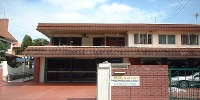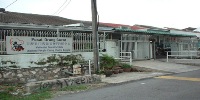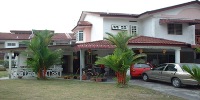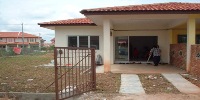Sunday, May 28, 2006
Sunday, May 14, 2006
阳光天使生活营 2006 (二)
一起走到
“当我们同在一起,在一起,在一起;当我们同在一起,其快乐无比。”
犹记得这首童年儿歌,意思是说:无论我们遇到多少困难、多少挫折,只要我们一起分享困难、一起重新站起来,我们就可以一起渡过难关,走到快乐伊甸园。
“当我们同在一起,在一起,在一起;当我们同在一起,其快乐无比。”
犹记得这首童年儿歌,意思是说:无论我们遇到多少困难、多少挫折,只要我们一起分享困难、一起重新站起来,我们就可以一起渡过难关,走到快乐伊甸园。
不再一样的志工
Simple Lifestyle.简单朴素的生活
“生命不在乎长短,乃关乎其内容,为他人能活而活得简朴,让他人有望而活得精彩”
Healthy Lifestyle.健康正常的生活
健康人当有的欠债感
如果我有财富,我欠穷者扶持的债
如果我有机会,我欠社会一些贡献
如果我有家庭,我欠浪子一些温情
如果我有教育,我欠文盲些许引导
Other-Centred Lifestyle.他人中心的生活
施比受更为有福
"We must not only give what we have; we must also give what we are"
Watchful Lifestyle.警惕机智的生活
“新闻呼唤我们怎样献身这个悲惨的世界,反省我们的信仰和实践”
“生命不在乎长短,乃关乎其内容,为他人能活而活得简朴,让他人有望而活得精彩”
Healthy Lifestyle.健康正常的生活
健康人当有的欠债感
如果我有财富,我欠穷者扶持的债
如果我有机会,我欠社会一些贡献
如果我有家庭,我欠浪子一些温情
如果我有教育,我欠文盲些许引导
Other-Centred Lifestyle.他人中心的生活
施比受更为有福
"We must not only give what we have; we must also give what we are"
Watchful Lifestyle.警惕机智的生活
“新闻呼唤我们怎样献身这个悲惨的世界,反省我们的信仰和实践”
不管怎样,总是要……
人们不讲道理、思想谬误、 自我中心
不管怎样,总是要爱他们
如果你做善事,人们说你自私自利、别有用心
不管怎样,总是要做善事
如果你成功以后,身边尽是假的朋友和真的敌人
不管怎样,总是要成功
你所做的善事明天就被遗忘
不管怎样,总是要行善
诚实与坦率使你易受攻击
不管怎样,总是要诚实坦率
你耗费数年所建设的可能毁于一旦
不管怎样,总是要建设
人们确实需要帮助,然而如果你帮助,他们却可能遭到攻击
不管怎样,总是要帮助
将你所拥有最好的东西献给世界,你可能被踢掉牙
不管怎样,总是要将你所拥有最好的东西献给世界
取自Lucinda Vardey主编的“一条简单的道路”
不管怎样,总是要爱他们
如果你做善事,人们说你自私自利、别有用心
不管怎样,总是要做善事
如果你成功以后,身边尽是假的朋友和真的敌人
不管怎样,总是要成功
你所做的善事明天就被遗忘
不管怎样,总是要行善
诚实与坦率使你易受攻击
不管怎样,总是要诚实坦率
你耗费数年所建设的可能毁于一旦
不管怎样,总是要建设
人们确实需要帮助,然而如果你帮助,他们却可能遭到攻击
不管怎样,总是要帮助
将你所拥有最好的东西献给世界,你可能被踢掉牙
不管怎样,总是要将你所拥有最好的东西献给世界
取自Lucinda Vardey主编的“一条简单的道路”
Disability no barrier for two in search of excellence
BY CHANG KIT TI
KUALA LUMPUR: He has been a polio patient since birth and walks with a limp in his left leg.
This physical defect, however, has never stopped Othman Badarishah, 47, from striving to be a role model for the disabled community.
His quest to excel paid off when he was named the recipient of the Exemplary Male Worker (Tokoh Pekerja Lelaki) award in the disabled persons category at the national-level Workers’ Day celebration here yesterday.
He received the award from Deputy Prime Minister Datuk Seri Najib Tun Razak, who also gave away 12 other awards in different categories at Stadium Putra in Bukit Jalil here.
“This award is an honour and reflects the Government’s recognition of the disabled community,” said Othman proudly.
After graduating from Western Michigan University with a Bachelor of Business Administration, he had pursued his Masters at Universiti Teknolgi Mara before starting his career as a junior officer at Affin Bank in 1983.
After 19 years, he quit his position as the bank’s vice-president in 2002 to serve and motivate others, particularly the disabled.
He is now a motivational speaker at the Social Welfare Department in Segamat, Johor, providing motivational training besides public speaking, stress management, customer service, problem-solving and decision-making.
Tan Kee Chok, 38, who was chosen as the award recipient in the women’s category, comes from a poor fisherman's family in Kampar, Perak, and has risen to become a state athlete and active community worker.
“I believe in being an example to others, particularly to my friends,” said Tan, who gave her state gold medals in the 50m and 100m swimming events at the Malaysia Paralympic Games last year.
Disabled since one year old due to polio, Tan dropped out of school after Form Three because of her family’s financial constraint. However, she was keen to continue her studies and enrolled at the Cheras Rehabilitation Centre.
“I only realised that the centre only provided training for tailoring upon joining it. I learned it anyway and worked for several companies before finding out about the Beautiful Gate Foundation (which provides skills training and education for the disabled),'' said Tan, who is now the assistant director of its Kampar branch.
Source : http://thestar.com.my/news/story.asp?file=/2006/5/14/nation/14239525&sec=nation
KUALA LUMPUR: He has been a polio patient since birth and walks with a limp in his left leg.
This physical defect, however, has never stopped Othman Badarishah, 47, from striving to be a role model for the disabled community.
His quest to excel paid off when he was named the recipient of the Exemplary Male Worker (Tokoh Pekerja Lelaki) award in the disabled persons category at the national-level Workers’ Day celebration here yesterday.
He received the award from Deputy Prime Minister Datuk Seri Najib Tun Razak, who also gave away 12 other awards in different categories at Stadium Putra in Bukit Jalil here.
“This award is an honour and reflects the Government’s recognition of the disabled community,” said Othman proudly.
After graduating from Western Michigan University with a Bachelor of Business Administration, he had pursued his Masters at Universiti Teknolgi Mara before starting his career as a junior officer at Affin Bank in 1983.
After 19 years, he quit his position as the bank’s vice-president in 2002 to serve and motivate others, particularly the disabled.
He is now a motivational speaker at the Social Welfare Department in Segamat, Johor, providing motivational training besides public speaking, stress management, customer service, problem-solving and decision-making.
Tan Kee Chok, 38, who was chosen as the award recipient in the women’s category, comes from a poor fisherman's family in Kampar, Perak, and has risen to become a state athlete and active community worker.
“I believe in being an example to others, particularly to my friends,” said Tan, who gave her state gold medals in the 50m and 100m swimming events at the Malaysia Paralympic Games last year.
Disabled since one year old due to polio, Tan dropped out of school after Form Three because of her family’s financial constraint. However, she was keen to continue her studies and enrolled at the Cheras Rehabilitation Centre.
“I only realised that the centre only provided training for tailoring upon joining it. I learned it anyway and worked for several companies before finding out about the Beautiful Gate Foundation (which provides skills training and education for the disabled),'' said Tan, who is now the assistant director of its Kampar branch.
Source : http://thestar.com.my/news/story.asp?file=/2006/5/14/nation/14239525&sec=nation
Difficulties Faced By Disabled Community
EDUCATION
The Department of Special Education established in 1995 looks into the needs of students who are blind, deaf and those with learning disabilities but exclude those who are physically handicapped with the mental ability to follow the normal curriculum and those with multiple disabilities, with "profound physical handicap or with severe mental retardation".
As a result, many students with mobility impairment who are able to attend mainstream schools are not being able to do so due to architectural barriers within the schools and many more disabled children not even considered for education.
VOCATIONAL TRAINING
Currently, there are a number of vocational training centres, run by both the government and NGOs, to cater to the training needs of people with disabilities. However, there is a need for more vocational training centres offering courses which teach skills that are more relevant in terms of providing employment opportunities such as IT and accountancy.
EMPLOYMENT
In 1989, the government announced that 1% of jobs in the public sector will be reserved for the people with disabilities. In 1990, the private sector was encouraged to do likewise. The Ministry of Human Resources has since helped out in the placement of people with disabilities in suitable jobs.
However, inspite of the incentives provided such as double tax deduction for the employment of disabled workers in the private sector, the quota is far from being filled.
The Progress Report (1996-2000) of the Mid-Term Review of the 8th Malaysia Plan revealed that only 3,489 jobs in the private sector and 536 in the public sector were offered to the disabled. More than 95% of people with disabilities are still unemployed.
HOUSING
Many disabled persons and their families face problems in obtaining affordable and appropriate housing due to poverty, non-enforcement of building by-laws requiring access and facilities for disabled persons, local authority requirements for low cost applicants which work against the disabled (eg applicants have to be married when many disabled are unable to find marriage partners due to prejudices) and outright discrimination faced by the disabled.
BUILT ENVIRONMENT
The Uniform Building By-Laws (1984) under the Street, Drainage and Building Act 1974 was amended in 1990.
It makes it mandatory for all new buildings to have facilities and amenities for people with disabilities. Subsequently, The Malaysian Standard (MS1184:91) Code of Practice for Access for the Disabled People to Public Buildings was drawn up to provide the specifications for the essential provisions that need to be incorporated into all buildings.
However, due to the lack of enforcement of the Act and Code of Practice, many buildings are still inaccessible to people with disabilities thereby preventing disabled persons from going to schools, to work, to go about their daily activities such as going to the post office, to banks, to the government offices, etc and from full participation in society.
TRANSPORTATION
Lack of accessible transportation appears to be one of the greatest problems faced by people with disabilities.
It should be recognised that providing accessible transportation benefits everybody, especially the growing number of elderly people and also parents with young children.
HEALTH AND MEDICAL CARE
FINANCIAL OF NGOs
NGOs have played a significant role in the development of social services in Malaysia. NGOs are also the major providers of services to people with disabilities and their families.
Due to financial shortage they have to dissipate their energy and resource raising funds from the public for most of their programmes and services instead of concentrating on the work for the disabled.
The Department of Special Education established in 1995 looks into the needs of students who are blind, deaf and those with learning disabilities but exclude those who are physically handicapped with the mental ability to follow the normal curriculum and those with multiple disabilities, with "profound physical handicap or with severe mental retardation".
As a result, many students with mobility impairment who are able to attend mainstream schools are not being able to do so due to architectural barriers within the schools and many more disabled children not even considered for education.
VOCATIONAL TRAINING
Currently, there are a number of vocational training centres, run by both the government and NGOs, to cater to the training needs of people with disabilities. However, there is a need for more vocational training centres offering courses which teach skills that are more relevant in terms of providing employment opportunities such as IT and accountancy.
EMPLOYMENT
In 1989, the government announced that 1% of jobs in the public sector will be reserved for the people with disabilities. In 1990, the private sector was encouraged to do likewise. The Ministry of Human Resources has since helped out in the placement of people with disabilities in suitable jobs.
However, inspite of the incentives provided such as double tax deduction for the employment of disabled workers in the private sector, the quota is far from being filled.
The Progress Report (1996-2000) of the Mid-Term Review of the 8th Malaysia Plan revealed that only 3,489 jobs in the private sector and 536 in the public sector were offered to the disabled. More than 95% of people with disabilities are still unemployed.
HOUSING
Many disabled persons and their families face problems in obtaining affordable and appropriate housing due to poverty, non-enforcement of building by-laws requiring access and facilities for disabled persons, local authority requirements for low cost applicants which work against the disabled (eg applicants have to be married when many disabled are unable to find marriage partners due to prejudices) and outright discrimination faced by the disabled.
BUILT ENVIRONMENT
The Uniform Building By-Laws (1984) under the Street, Drainage and Building Act 1974 was amended in 1990.
It makes it mandatory for all new buildings to have facilities and amenities for people with disabilities. Subsequently, The Malaysian Standard (MS1184:91) Code of Practice for Access for the Disabled People to Public Buildings was drawn up to provide the specifications for the essential provisions that need to be incorporated into all buildings.
However, due to the lack of enforcement of the Act and Code of Practice, many buildings are still inaccessible to people with disabilities thereby preventing disabled persons from going to schools, to work, to go about their daily activities such as going to the post office, to banks, to the government offices, etc and from full participation in society.
TRANSPORTATION
Lack of accessible transportation appears to be one of the greatest problems faced by people with disabilities.
It should be recognised that providing accessible transportation benefits everybody, especially the growing number of elderly people and also parents with young children.
HEALTH AND MEDICAL CARE
- Appropriate treatment
- Rehabilitation hospital for persons with spinal cord injury and those who are chronically ill
- Rehabilitation aids and assistive devices
- Carer system should be organised to help relieve the burden of the families
FINANCIAL OF NGOs
NGOs have played a significant role in the development of social services in Malaysia. NGOs are also the major providers of services to people with disabilities and their families.
Due to financial shortage they have to dissipate their energy and resource raising funds from the public for most of their programmes and services instead of concentrating on the work for the disabled.
Saturday, May 13, 2006
Disabled-friendly approach a plus for neighbourhood
Photos by ANDREW CHONG and courtesy of BEAUTIFUL GATE
 Pastor Sia says that while many constraints still exist, SS2 is a haven compared to many other areas.
Pastor Sia says that while many constraints still exist, SS2 is a haven compared to many other areas.
FOR THE disabled community, SS2 is a haven compared to many other housing estates in PJ, despite the many constraints that still exist.
Thanks to the local council, barrier-free walkways have been installed in the SS2 commercial area under the Local Agenda 21 plan and as part of the Petaling Jaya Barrier-Free programme to promote easy accessibility for the disabled, senior citizens and children.
According to Damansara Utama assemblyman and SS2 Cares working committee chairman Datuk Lim Choon Kin, the RM470,000 pilot project saw the instalment of various facilities including barrier-free walkways from SS2/24 (outside Beautiful Gate Foundation) to the SS2 commercial square, ramps, two parking lots and one toilet for the disabled within the park (also accessible) in the middle of the square.
“The disabled community needs to get out, too; being cooped indoors can limit their growth emotionally, mentally and spiritually,” said Beautiful Gate Foundation executive director Pastor Sia Siew Chin.
Beautiful Gate was established in SS2 in 1995, and its inhabitants have seen neighbourhood develop in their favour over the years, albeit very slowly.
 “The government has helped us build ramps to access the corridors in the main commercial centre, but we need the cooperation of the public and the business community,” said Sia.
“The government has helped us build ramps to access the corridors in the main commercial centre, but we need the cooperation of the public and the business community,” said Sia.
With the exception of SaveMart, Beautiful Gate residents said the other shop lots are inaccessible. The public, meanwhile, are inconsiderate and constantly block the ramps with their vehicles or park at spots designated for the disabled.
Nevertheless, Sia says there are small mercies to be thankful for, such as the residents' willingness to welcome the disabled community into their neighbourhood.
“I felt so included and touched when I was approached by SS2B Rukun Tetangga to be part of their committee.
“They displayed a keenness to understand us, and have educated us in certain things.
“They've made us feel at home,” said Sia, who is also a committee member of SS2 Cares.
Source : http://thestar.com.my/news/story.asp?file=/2006/5/13/central/14222267&sec=central
 Pastor Sia says that while many constraints still exist, SS2 is a haven compared to many other areas.
Pastor Sia says that while many constraints still exist, SS2 is a haven compared to many other areas.FOR THE disabled community, SS2 is a haven compared to many other housing estates in PJ, despite the many constraints that still exist.
Thanks to the local council, barrier-free walkways have been installed in the SS2 commercial area under the Local Agenda 21 plan and as part of the Petaling Jaya Barrier-Free programme to promote easy accessibility for the disabled, senior citizens and children.
According to Damansara Utama assemblyman and SS2 Cares working committee chairman Datuk Lim Choon Kin, the RM470,000 pilot project saw the instalment of various facilities including barrier-free walkways from SS2/24 (outside Beautiful Gate Foundation) to the SS2 commercial square, ramps, two parking lots and one toilet for the disabled within the park (also accessible) in the middle of the square.
“The disabled community needs to get out, too; being cooped indoors can limit their growth emotionally, mentally and spiritually,” said Beautiful Gate Foundation executive director Pastor Sia Siew Chin.
Beautiful Gate was established in SS2 in 1995, and its inhabitants have seen neighbourhood develop in their favour over the years, albeit very slowly.
 “The government has helped us build ramps to access the corridors in the main commercial centre, but we need the cooperation of the public and the business community,” said Sia.
“The government has helped us build ramps to access the corridors in the main commercial centre, but we need the cooperation of the public and the business community,” said Sia.With the exception of SaveMart, Beautiful Gate residents said the other shop lots are inaccessible. The public, meanwhile, are inconsiderate and constantly block the ramps with their vehicles or park at spots designated for the disabled.
Nevertheless, Sia says there are small mercies to be thankful for, such as the residents' willingness to welcome the disabled community into their neighbourhood.
“I felt so included and touched when I was approached by SS2B Rukun Tetangga to be part of their committee.
“They displayed a keenness to understand us, and have educated us in certain things.
“They've made us feel at home,” said Sia, who is also a committee member of SS2 Cares.
Source : http://thestar.com.my/news/story.asp?file=/2006/5/13/central/14222267&sec=central
Subscribe to:
Posts (Atom)





